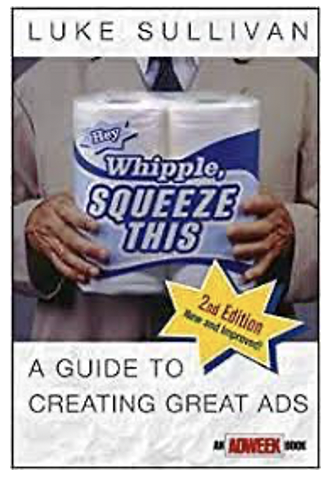Hey Whipple, Squeeze This: A Guide to Creating Great Ads by Luke Sullivan
For my latest ‘Bookshelf Brainwave’ I have chosen Luke Sullivan’s classic guide to creativity in advertising, dedicated to inspiring creatives to amaze clients, outsmart account people, do brilliant work that works, and even win awards. At the turn of the century when he wrote the book, he acknowledged the effectiveness of banal, repetitious ads, but urged his readers to dedicate themselves to coming up with better work.

Mr Whipple on the book’s cover was the annoying grocer who sold billions of Charmin toilet paper in America for P&G by telling housewives not to squeeze the pack, and then did it himself when they weren’t looking.
Luke is a pundit and guru now. But he was an outstanding copywriter, best known for his stints at two highly creative agencies in the US – Fallon McElligott (Minneapolis MN) and The Martin Agency (Richmond VA).
You are perfectly entitled to ask why in this era of Brand Purpose I should be harking back to a book published nearly a quarter of a century ago, that explained how to write breakthrough ads designed to persuade people to buy things (and specifically our brands rather than the competition).
Two answers
Firstly, I still believe that impact and persuasion (along with informing and reminding) are the principal reasons why brand owners have spent money on ads over the years.
Secondly, I am equally convinced that brand owners will soon realise that their goal is not just to do business with people who believe what they believe (as the brand purpose zealots advocate), but more prosaically to sell stuff to people who might appreciate their brands and products, and want to buy them.
Any evening’s viewing nowadays will provide ample evidence that advertising is in danger of losing its way in a miasma of social engineering and correctness. As I see it, the enemy is not repetitious ads. It is ads that look like ads, but simply don’t work.
In his book Luke Sullivan has so many tips for aspirant creatives – in terms of both coming up with ideas and selling them. The best thing I can do is not editorialise, but share 20 of the best with you. Get hold of your copy of the book. Most of the editions are still available on Amazon.
Coming up with ideas
- Always remember the six phases of an advertising project: Enthusiasm, Disillusionment, Panic, Search for the Guilty, Punishment of the Innocent, Praise and Honours for the Non-Participants.
- 20% of your time will be spent thinking up ads. 80% protecting your ideas. 30% doing them over
- Come up with a lot of ideas. Cover the wall.
- Being stuck is a good thing. Really. It probably means you have moved through all the easy stuff
- If you’re stuck, leave the room and try working somewhere else – like a store where they sell the product for instance.
- ‘Is creativity some obscure, esoteric art form? Not on your life. It’s the most practical thing a business person can employ’ (Bill Bernbach).
- ‘Love, honour and obey your hunches’ (Leo Burnett).
- Funny isn’t a language. Funny is a subset of interesting. Funny is an accent. And it may not be the right accent.
- Extensive research has proved that extensive research is often wrong.
- Science cannot breathe life into something. Dr Frankenstein has tried this already.
Selling your ideas
- Listening doesn’t mean saying ‘yes’.
- Cut your client some slack. Buying creative work is hard.
- And they just might be right!
- Learn the client’s corporate culture.
- If possible, present your own work.
- Practice selling your work before you go into present.
- Don’t hand out materials before presenting advertising ideas.
- Don’t be slick. Clients hate slick.
- Don’t tell the clients ‘this is risk-taking work’. Clients hate that too.
- Don’t assure the client that ‘you are going to love this’. They won’t.
Featured image: Samuel Regan-Asante / Unsplash




























